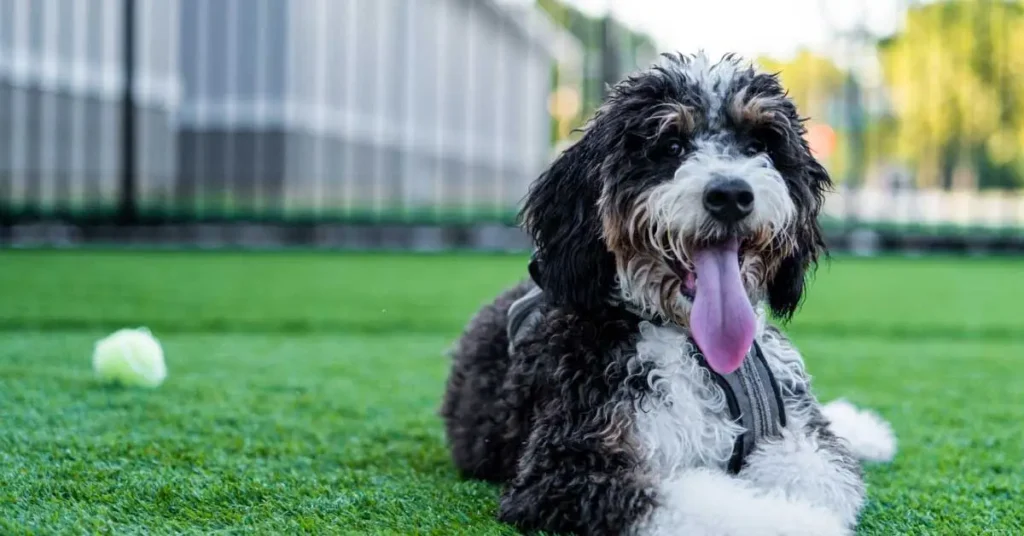Discovering the unique blend of traits that mini Bernedoodles bring to families and individuals alike is an adventure in itself. This designer breed, a cross between the Bernese Mountain Dog and the Miniature Poodle, offers a captivating array of characteristics that cater to a wide range of lifestyles, making them highly sought after. The nuanced mini Bernedoodle characteristics are not just about their hypoallergenic coats or the range of sizes from teacup to standard mini, but also encompass their vibrant personalities and health predispositions.
Their adaptive nature, combined with the physical and mental benefits they bring, highlights their growing popularity among dog enthusiasts who value intelligence, affection, and low-shedding qualities in their canine companions. For more mini Bernedoodle information, read on to discover what makes a mini Bernedoodle so special.
This article delves into the essentials of mini Bernedoodle characteristics, from their physical appearance that includes the iconic curly coat and diverse color patterns like black and white or brown and white, to their temperament that showcases both their high energy and cuddly, affectionate side. Prospective and current owners will gain insight into the breed’s health and care needs, including grooming necessities like brushing and clipping, mindfulness about common health issues such as hip and elbow dysplasia, and the importance of mental stimulation and positive reinforcement in training.
Additionally, for those contemplating the suitability of a mini Bernedoodle for their home, this guide offers an in-depth look at why these adaptable and versatile dogs make excellent family pets, therapy dogs, and companions for both active individuals and those living in apartment settings. This comprehensive mini Bernedoodle information will provide you with all the facts about mini Bernedoodles you need to know.
Physical Characteristics of Mini Bernedoodle
Mini Bernedoodles, a delightful hybrid of the Bernese Mountain Dog and the Miniature Poodle, exhibit a range of physical characteristics that make them both unique and adaptable to various lifestyles. This section explores their size, weight, coat types, colors, and distinctive features, providing a detailed look at what a mini Bernedoodle looks like.
Size and Weight
Mini Bernedoodles typically stand between 18 to 22 inches tall at the shoulder and weigh between 25 to 50 pounds. Their size can vary significantly, even within the same litter, due to the genetic contributions of their parent breeds. They generally stop growing in height by about 11 to 12 months of age but continue to fill out in muscle mass and weight until about 14 to 16 months.
This manageable size makes them suitable for both apartment living and larger homes, accommodating a variety of living situations. So, how big do mini Bernedoodles get? The answer is that their size is quite adaptable, making the miniature Bernedoodle a versatile choice for many living environments.
Coat Types and Colors
The coat of a Mini Bernedoodle can vary greatly and is available in several types including curly, wavy, and straight, each coming with its own set of maintenance needs. Curly coats, deriving from their Poodle ancestry, are known for being low-shedding and hypoallergenic, making them ideal for families with allergies.
These coats require regular grooming to prevent matting. Wavy coats are more common and require less maintenance, while straight coats may shed more and display a slightly wavy texture. So, are mini Bernedoodles hypoallergenic? Yes, especially those with curly coats. Do mini Bernedoodles shed? It depends on the coat type, with wavy coats shedding less than straight ones.
In terms of color, Mini Bernedoodles may exhibit a wide range, including black, white, gray, brown, and even tri-color patterns. The tri-color mini bernedoodle pattern, often seen in Bernese Mountain Dogs, includes black, white, and hints of red or brown, often arranged in a striking, symmetrical pattern across the body. This variety in color makes it easy to identify what a mini Bernedoodle looks like, especially with the distinctive tricolor markings.
Distinctive Features
Mini Bernedoodles often inherit the charming features of their Bernese Mountain Dog parents with markings that are unique to each individual dog. Some may have a speckled coat, while others display more solid or bi-color coats. Their appearance can vary greatly depending on which parent breed they take after more dominantly. This variability makes each Mini Bernedoodle distinct, with no two dogs looking exactly alike, further highlighting what a mini Bernedoodle looks like.
Regular exercise and proper nutrition play crucial roles in the development and maintenance of these characteristics, ensuring that each Mini Bernedoodle lives a healthy, active, and fulfilling life. Their adaptable nature and striking appearance not only make them wonderful companions but also add a touch of beauty and joy to any family.
Temperament and Personality
Mini Bernedoodles are cherished for their wonderful temperaments, making them excellent companions for families and individuals alike. They exhibit a delightful blend of traits acquired from their parent breeds, the Bernese Mountain Dog and the Miniature Poodle, which contribute to their sociable, intelligent, and energetic nature. Understanding the mini Bernedoodle temperament and mini Bernedoodle personality helps prospective owners appreciate their unique qualities.
Sociability with Humans and Pets
Mini Bernedoodles thrive on social interaction and are known for their outgoing and friendly demeanor. They tend to make friends easily, whether with humans or other animals. This breed is particularly good with children, displaying a gentle tolerance for noise and activity, which makes them superb family pets.
However, it is crucial to teach children how to interact properly with these dogs to prevent any accidental harm due to rough play. Mini Bernedoodles also generally get along well with other pets, especially when introduced from a young age, which can lead to harmonious relationships within a multi-pet household. Their friendly nature ensures they are good with kids and good with other pets, making them a versatile addition to any home.
Intelligence and Trainability
The intelligence of Mini Bernedoodles is a standout trait, inherited from both the intelligent Bernese Mountain Dog and the highly trainable Miniature Poodle. This combination makes the Mini Bernedoodle an eager and quick learner. They respond excellently to positive reinforcement, making training not just successful but an enjoyable bonding experience for both the dog and owner.
Early socialization and consistent training are crucial in nurturing a well-behaved pet, as these dogs are also known to inherit a slight stubborn streak from their Bernese lineage. Their love for learning can be channeled into various activities like agility training, obedience, and even complex trick training, showcasing the unique Mini Bernedoodle personality.
Energy Level and Exercise Needs
Despite their adaptable nature, Mini Bernedoodles possess a fairly high energy level which must be managed with regular and varied exercise. They require at least an hour of active play daily, supplemented by walks and mental stimulation through training and interactive play. This breed thrives on activities that challenge both their mind and body, preventing boredom and potential destructive behavior. An adequately exercised Mini Bernedoodle is not only a healthier dog but also a more content and well-balanced companion.
Health and Care
Maintaining the health and well-being of a Mini Bernedoodle involves understanding their specific needs in terms of diet, grooming, and general healthcare. This section provides detailed insights into the common Mini Bernedoodle health issues, grooming requirements, and nutritional needs of Mini Bernedoodles.
Common Health Issues
Mini Bernedoodles, like all breeds, are susceptible to certain health conditions inherited from their Bernese Mountain Dog and Poodle lineage. Key concerns include hip and elbow dysplasia, both of which are joint conditions that can lead to discomfort and mobility issues. Regular veterinary check-ups are crucial for early detection and management of these conditions.
Progressive Retinal Atrophy (PRA), an inherited eye condition, is also a concern and can lead to blindness if not monitored. Owners should ensure that breeding parents have been tested for PRA to minimize the risk. Additionally, Mini Bernedoodles can be prone to bloat, a serious condition where the stomach distends and may twist. To prevent bloat, it is advisable to feed smaller, more frequent meals and avoid vigorous exercise around feeding times.
Regular grooming and ear care are essential to prevent ear infections, and owners should be aware of potential skin issues like sebaceous adenitis. So, do Mini Bernedoodles have health issues? Yes, but with proper care, many of these can be managed effectively.
Grooming Needs
Grooming a Mini Bernedoodle is not just about aesthetics; it is crucial for maintaining their overall health. Depending on their coat type—curly, wavy, or straight—the grooming needs may vary. Curly coats, being the most hypoallergenic, require regular brushing to prevent matting and are least likely to shed. Wavy coats need less frequent grooming but should still be brushed several times a week to avoid tangles and mats. Straight coats may shed more and require regular brushing to manage loose hairs.
Regardless of the coat type, all Mini Bernedoodles benefit from regular baths, nail trims, and ear cleaning to prevent infections. It is important to use dog-specific grooming products to avoid irritation and to maintain the natural oils in their coat. So, are Mini Bernedoodles hypoallergenic? Curly-coated ones are the most hypoallergenic among them.
Diet and Nutrition
A balanced diet is vital for the Mini Bernedoodle’s health. Puppies should be fed three to four meals a day until six months old, transitioning to two meals a day thereafter. Adult Mini Bernedoodles should have a diet that includes high-quality proteins, healthy fats, and carbohydrates, with an emphasis on foods that support joint health like those containing glucosamine and chondroitin. Owners should be cautious of grain-free diets, which have been linked to health issues such as Dilated Cardiomyopathy (DCM) and other metabolic problems.
Instead, opt for diets that include wholesome grains unless there is a specific allergy. Regular consultations with a veterinarian can help tailor the diet to meet the dog’s individual health needs, ensuring they receive the right balance of nutrients. Always provide access to fresh water to maintain hydration.
By adhering to these guidelines, owners can help ensure their Mini Bernedoodle remains healthy, happy, and a vibrant member of the family for years to come. Regular veterinary visits and a proactive approach to health and grooming can prevent many common issues associated with this charming breed.
Why Mini Bernedoodles Make Great Pets
Mini Bernedoodles are cherished for their unique combination of traits that make them ideal family companions. These dogs inherit the loyalty and protective nature of the Bernese Mountain Dog along with the intelligence and playful spirit of the Miniature Poodle, making them not only versatile but deeply integrated into the lives of their owners. This unique Mini Bernedoodle temperament makes them a beloved addition to any family.
Adaptability to Living Environments
Mini Bernedoodles excel in various living conditions, from spacious homes with large yards to compact apartments. Their adaptability is enhanced by their size, typically ranging from 13 to 22 inches in height and weighing between 20 to 40 pounds, making them perfect for both rural and urban settings.
Despite their adaptability, they require regular exercise to stay healthy and happy. Owners should ensure that these dogs receive adequate physical and mental stimulation regardless of the living space size. The Miniature Bernedoodle is truly a versatile and adaptable breed.
Compatibility with Families and Children
The Mini Bernedoodle is known for its gentle and patient nature, making it a superb choice for families with children. These dogs are not only tolerant and forgiving of children’s rough play but are also eager to engage in games and activities, often becoming a child’s adventurous and affectionate playmate.
Their intuitive nature allows them to connect with family members on a deep emotional level, offering comfort and companionship. The strong bond that Mini Bernedoodles form with their families is built on mutual affection and loyalty, which is particularly evident in their interactions with children. This affectionate Mini Bernedoodle personality makes them especially good with kids.
Longevity and Emotional Bond
Mini Bernedoodles typically enjoy a lifespan of 10 to 15 years, during which they provide continuous affection and companionship to their families. Regular veterinary care, a balanced diet, and consistent exercise contribute significantly to their longevity. The emotional bond that forms between a Mini Bernedoodle and its family is profound, as these dogs often sense and respond to the emotional cues of their owners, providing support and comfort during times of stress or sadness. Understanding the mini Bernedoodle lifespan can help owners prepare for a long-term commitment to their furry friend.
In conclusion, Mini Bernedoodles make excellent pets due to their adaptable nature, compatibility with children, and the strong emotional bonds they form with their owners. Their ability to thrive in diverse environments and their innate qualities of intelligence, loyalty, and affection make them not just pets, but cherished family members. As a family pet, they bring joy and companionship to households of all kinds.
Conclusion
Exploring the delightful characteristics and robust personalities of Mini Bernedoodles reveals a breed uniquely tailored to bring joy, companionship, and adaptability into the lives of their human counterparts. As we delve into their physical traits, temperament, health requirements, and suitability for various living environments, it becomes clear that these dogs are more than just pets; they embody the perfect amalgamation of the Bernese Mountain Dog’s loyalty and the Poodle’s intelligence.
Their hypoallergenic coats, sociable nature, and ability to form deep emotional connections cater to a wide demographic, from active individuals to families with children, highlighting their versatility and appeal as a breed. The attention given to their care, from daily exercise to regular grooming, underscores the commitment required to ensure they lead a healthy, fulfilling life as a valued family member. Understanding what a Mini Bernedoodle is can help potential owners appreciate their unique qualities.
FAQs
What should I consider before adopting a Bernedoodle?
Before bringing a Bernedoodle into your home, it’s important to know that they are generally friendly and excellent with families but may be initially wary of strangers. Early and ongoing socialization with various people, children, and other animals is crucial to help them become well-adjusted adults.
What are some disadvantages of owning a mini Bernedoodle?
Owning a Mini Bernedoodle comes with a few challenges. Their coat, though beneficial for people with allergies due to its low shedding, requires consistent grooming to maintain. Additionally, Bernedoodles can inherit certain health issues from their parent breeds, which prospective owners should consider. Being aware of mini Bernedoodle health issues can help in providing the best care for these dogs.
Do mini Bernedoodles make good indoor pets?
Mini Bernedoodles are known for their patience and gentleness, making them suitable companions for the elderly and young children alike. They can adapt well to apartment living provided they are given regular walks and sufficient exercise to keep them healthy and happy. Their friendly nature and being good with kids make them ideal for family settings.
Is it easy to train a mini Bernedoodle?
Mini Bernedoodles are intelligent and eager to learn, which makes them relatively easy to train. They are naturally curious and alert, thriving in various training environments such as agility and obedience training. Engaging them in different learning activities throughout the day can be a rewarding experience for both the dog and the owner. Their mini Bernedoodle personality shines through in puppy training sessions, making them delightful companions.


